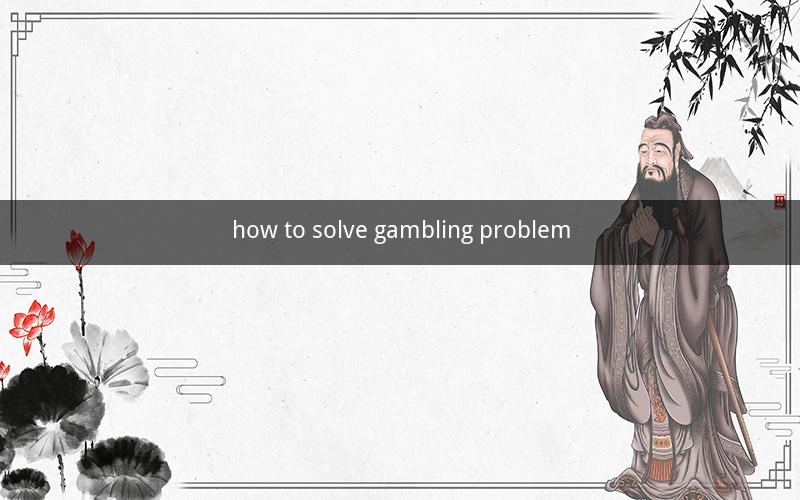
Table of Contents
1. Understanding the Problem
2. Identifying Risk Factors
3. Seeking Professional Help
4. Support Systems and Resources
5. Self-Reflection and Self-Care
6. Developing Coping Strategies
7. Changing Social Environments
8. Legal and Ethical Considerations
9. Long-Term Recovery and Maintenance
10. Conclusion
1. Understanding the Problem
Gambling addiction, also known as compulsive gambling, is a complex issue that affects individuals, families, and communities. It involves an uncontrollable urge to gamble, despite negative consequences. Understanding the nature of the problem is the first step towards finding a solution.
2. Identifying Risk Factors
Several factors can contribute to the development of a gambling problem. These include genetic predisposition, mental health issues, environmental factors, and personal vulnerabilities. Identifying these risk factors can help individuals and professionals develop targeted strategies for prevention and intervention.
3. Seeking Professional Help
Professional help is essential for individuals struggling with gambling addiction. Therapists, counselors, and addiction specialists can provide tailored treatment plans that address the underlying causes and symptoms of the problem. Therapy methods may include cognitive-behavioral therapy, family therapy, and motivational interviewing.
4. Support Systems and Resources
Support systems play a crucial role in overcoming a gambling problem. Support groups, such as Gamblers Anonymous, offer a community of individuals who share similar experiences and challenges. Additionally, online resources, hotlines, and helplines provide information and assistance for those in need.
5. Self-Reflection and Self-Care
Self-reflection is an essential component of overcoming a gambling problem. Individuals must examine their behaviors, emotions, and thought patterns related to gambling. Self-care practices, such as exercise, meditation, and hobbies, can help individuals develop healthier coping mechanisms and reduce the urge to gamble.
6. Developing Coping Strategies
Coping strategies are essential for managing the urge to gamble and dealing with the emotional and psychological challenges that arise from addiction. These strategies may include relaxation techniques, stress management, and positive affirmations. Identifying and implementing effective coping strategies can significantly improve an individual's chances of recovery.
7. Changing Social Environments
Social environments can either exacerbate or mitigate a gambling problem. Individuals may need to distance themselves from gambling-related activities, such as casinos, online gambling sites, and social gatherings involving gambling. Building a supportive network of friends and family who understand and support the individual's recovery is crucial.
8. Legal and Ethical Considerations
Legal and ethical considerations are important when addressing gambling addiction. Individuals should be aware of the legal consequences of their actions and seek legal advice if necessary. Ethical considerations involve respecting the rights and dignity of individuals with gambling problems and ensuring that treatment approaches are non-judgmental and compassionate.
9. Long-Term Recovery and Maintenance
Long-term recovery from a gambling problem requires ongoing effort and commitment. Individuals must continue to engage in therapy, support groups, and self-care practices. They may also need to address underlying issues, such as financial problems, legal issues, and relationship difficulties. Maintaining long-term recovery involves identifying and managing triggers, staying connected with support systems, and celebrating milestones.
10. Conclusion
Overcoming a gambling problem is a challenging but achievable goal. By understanding the problem, identifying risk factors, seeking professional help, and developing coping strategies, individuals can take steps towards recovery. Support systems, self-care, and long-term commitment are essential for maintaining a healthy and fulfilling life.
Questions and Answers
1. What are the signs of a gambling problem?
- Signs of a gambling problem include preoccupation with gambling, loss of control over gambling behavior, lying about gambling activities, increased debt, and neglecting personal responsibilities.
2. Can genetics contribute to a gambling problem?
- Yes, genetics can play a role in the development of a gambling problem. Research suggests that certain genetic factors may increase an individual's susceptibility to addiction.
3. How can therapy help with gambling addiction?
- Therapy can help individuals understand the underlying causes of their gambling problem, develop coping strategies, and address co-occurring mental health issues. It can also provide a supportive environment for individuals to work through their challenges.
4. Are there any medications that can help with gambling addiction?
- While there are no medications specifically designed to treat gambling addiction, certain medications may help manage symptoms of co-occurring conditions, such as depression or anxiety.
5. How can I find a support group for gambling addiction?
- You can find support groups by contacting Gamblers Anonymous, local mental health organizations, or searching online directories of support groups.
6. What are some self-care practices that can help with gambling addiction?
- Self-care practices that can help with gambling addiction include exercise, meditation, hobbies, and spending time with loved ones.
7. How can I change my social environment to support my recovery?
- You can change your social environment by avoiding gambling-related activities, building a supportive network of friends and family, and seeking out positive social experiences.
8. What are some legal consequences of gambling addiction?
- Legal consequences of gambling addiction may include financial difficulties, legal actions by creditors, and potential criminal charges related to fraud or theft.
9. How can I maintain long-term recovery from a gambling problem?
- Maintaining long-term recovery involves ongoing therapy, participation in support groups, self-care practices, and addressing triggers and challenges as they arise.
10. What resources are available for individuals struggling with gambling addiction?
- Resources for individuals struggling with gambling addiction include Gamblers Anonymous, mental health organizations, hotlines, and online support groups.